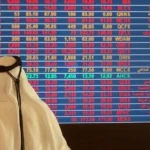A popular yen-centered carry trade that blew up spectacularly two weeks ago is staging a comeback.
Japan’s currency has weakened more than 5% against the dollar since August 5, when a cocktail of hawkish Japan monetary policy moves, jitters around US earnings, and a feeble jobs report catapulted the yen to a seven-month high.
Nomura Holdings Inc., Japan’s biggest brokerage, has seen a variety of investors start borrowing the yen again to invest the proceeds elsewhere in higher-yielding assets. It suggests corporate clients and hedge funds, who have been enthusiastic carry traders, are getting back into those deals.
“There has been a notable move back” into carry trades after US retail sales data beat estimates, said Antony Foster, head of Group-of-10 spot trading at Nomura in London. Multiple accounts have sold yen to buy the Australian dollar and sterling, he said. US bond yields rose Thursday after the sales data spurred traders to dial back their expectations for Federal Reserve interest rate cuts this year.
The move back into carry trades highlights the allure of a strategy that could provide quick profits for investors that used it. Traders wagered billions of dollars that the yen would weaken, before the currency jumped last month. Fueling the popularity of the trade in the past were expectations that the Bank of Japan would keep interest rates at rock-bottom levels as it had for two decades, but its two rate hikes this year to fight emergent inflation have shown the dangers of the strategy.
ATFX Global Markets, an Australian online forex broker, has seen around a 30% to 40% rise in yen shorts in the past week, with a big chunk of the bets driven by hedge funds and high-net-worth investor clients.
One of the key questions for investors still sitting on the carry-trade sidelines is whether the Bank of Japan will hike interest rates again this year. BOJ Deputy Governor Shinichi Uchida has already indicated that policymakers won’t raise rates further if financial markets are unstable.
BOJ Outlook
If the BOJ holds fire, then the allure of re-entering the trade is poised to grow.
Traders may get further clarity on the trade this coming week with BOJ Governor Kazuo Ueda due to speak before parliament on August 23. They may also be emboldened if Federal Reserve Chair Jerome Powell, in his Jackson Hole speech due the same day, pushes back against bets by some traders that the US central bank will ease monetary policy by half a percentage point in September.
If Ueda sounds dovish while Powell appears hawkish, that should keep interest rate differences between the US and Japan elevated, enticing more investors to enter carry trades.
Among those shorting the yen now is Calvin Yeoh, who helps manage the Merlion Fund at Blue Edge Advisors in Singapore.
The fund is “still short,” said Yeoh, a money manager at the hedge fund who entered a bearish yen trade against the pound earlier this week. “We’ll try and ride this back up to pre-BOJ levels if the trend allows and volatility continues to settle into prior ranges.”
Mary Nicola, Markets Live Strategist, said: “Global central banks are now shifting toward easing, barring the BOJ which will still keep rates low relative to peers. That means the carry trade is poised to make a comeback, provided that equity markets and the Chinese currency remain stable.”
The yen has slid to around 149 per dollar since touching 141.70 on August 5, but investors still remain cautious about selling the Japanese currency given its sudden surge earlier this month. “The big over-hang short yen position has been wiped out, but this market is extremely fragile,” says Foster at Nomura.
Japan PM Fumio Kishida To Step Down In September Amid Growing Scandals





